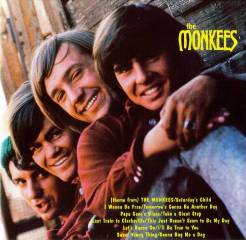The Monkees - The Monkees (1966)
The Monkees - The Monkees (1966)

1. (Theme From) The Monkees 2. Saturday's Child 3. I Wanna Be Free 4. Tomorrow's Gonna Be Another Day 5. Papa Gene's Blues 6. Take A Giant Step 7. Last Train To Clarksville 8. This Just Doesn't Seem To Be My Day 9. Let's Dance On 10. I'll Be True To You 11. Sweet Young Thing 12. Gonna Buy Me A Dog 13. I Can't Get Her Off My Mind (Prev. Unissued Early Version) 14. I Don't Think You Know Me (Prev. Unissued Alternate Version) 15. (Theme From) The Monkees (Prev. Unissued Early Version) Michael Nesmith - Guitar, Vocals Peter Tork - Bass, Guitar, Vocals Micky Dolenz - Drums, Guitar, Keyboards, Vocal Harmony, Vocals Davy Jones - Vocals + Keith Allison - Harmonica Hal Blaine - Drums Tommy Boyce - Vibraphone Jimmy Bryant - Bass, Fiddle James Burton - Guitar Glen Campbell - Guitar Al Casey - Guitar Gary Coleman - Percussion Bob Cooper - Oboe Mike Deasy Sr. - Guitar Frank DeVito - Drums Joseph Ditullio - Cello Bonnie Douglas - Violin Wayne Erwin - Guitar, Guitar (Electric) Gene Estes - Percussion Jim Gordon - Drums Bobby Hart - Autoharp, Glockenspiel, Organ, Vocals (Background) Myra Kestenbaum - Viola Larry Knechtel - Organ Bill Lewis - Drums Gerry McGee - Guitar, Guitars Donald Peake - Guitar William Pitman - Bass Michel Rubini - Harp Frederick Seykora - Cello Louie Shelton - Guitars Paul Shure - Violin Larry Taylor - Bass David Walters - Percussion
The Monkees' first album was a huge success, following on the number one single "Last Train to Clarksville." The Monkees spent 78 weeks on the Billboard chart including an astounding 13 weeks at number one. The record wasn't only a commercial juggernaut, it also stands as one of the great debuts of all time, and while the record and the group have faced criticism from rock purists through the ages, it stands the test of time perfectly well, sounding as alive and as much fun 40 years later. Prefabricated? Yes. After a fast buck? Yes. Exhilarating? Yes! Fab? Definitely! The music may have been created by studio cats instead of the band themselves but the pros weren't merely phoning it in. Listen to the aggressive guitars on "Saturday's Child," the raw romp of "Tomorrow's Gonna Be Another Day," or the cascading wall of guitars and fiddles on "Sweet Young Thing," and you know they weren't just padding their bank accounts. They were playing some real rock & roll and you can credit the producers for that. Producers Tommy Boyce and Bobby Hart aren't craftsmen on the level of Phil Spector (who was actually approached to produce the band but probably laughed The Monkees' team right out the door), but they knew how to craft razor-sharp and exciting pop tunes with lots of spark, soul, and the occasional psychedelic touch.
And they knew how to get great vocals from their group. While The Monkees themselves didn't do much more than sing, the singing they did was first-rate. You'd be hard-pressed to find a better pop/rock vocalist than Micky Dolenz; his work on "Take a Giant Step" and "Last Train to Clarksville" is thrilling and bursting with life. The other lead vocalist, Davy Jones, thankfully doesn't get a chance to show off his full range of annoyingly whimsical mannerisms; Boyce and Hart keep him under wraps and his vocals on "I Wanna Be Free" and "I'll Be True to You" are achingly sweet, even a little soulful in a very British way. Boyce and Hart weren't the only great producers involved with the record, as a listen to "Papa Gene's Blues" and "Sweet Young Thing" show that Mike Nesmith also knew how to produce great pop music, despite what Don Kirshner may have thought. The various producers, supervisors, and coordinators were also savants when it came to both writing (in Boyce, Hart, and Nesmith's case) and picking songs for the group. Indeed, the only songs that feel like filler are the rudimentary rocker "Let's Dance On" and the silly "Gonna Buy Me a Dog," but even these throwaways are charming and stand up to repeated listens. It's easy to see why kids were buying this record as fast as the label could press them up. Despite the origins of the group and the behind-the-scenes machinations, the music itself is young, exciting, and free. Who cares who did what and who didn't do what when the results are as rock-solid as "Last Train to Clarksville" or "Sweet Young Thing"? You could stack The Monkees up against almost any record of 1966 and the competition would be fierce, with this record coming out on top except in only a few cases. ---Tim Sendra, Rovi
Last Updated (Friday, 28 April 2017 09:04)








